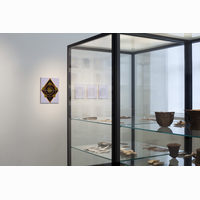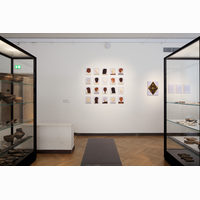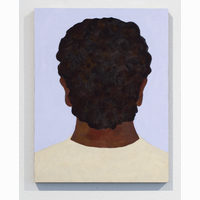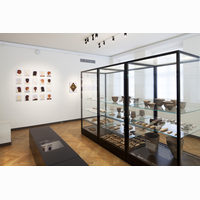Shaped By Times
Anette Abrahamsson [DK/SE]
The Forgotten
A grid of individual icon paintings hangs on the back wall of a room with Neolithic earthenware, among them the beautifully decorated Skarpsalling pot (3200BC, p 41-42), showing the embossed marks made by the human hand and providing an entrée into painterly questions of mark, color, and composition. In the paintings, a series of heads are depicted from behind, identifed only by hair and a skin color in a slight a pro- fle. Anette Abrahamsson generalizes the particular features of ethnic type to suggest a universal fgure. Since their faces are hidden from us, they are both recognizable and blank. In their gesture of turning away from the viewer, Abrahamsson’s fgures allude to our inner conception of time and to the Romantic tradition of the Sublime. The busts have been painted laboriously in tiny brushstrokes of tempera paint and in a somewhat naïve style, set against a pale blue background of seemingly infnite space. The palette picks up on the browns, pinks, and grays of the Neolithic ceramics in the room. It suggests human morphology related to the objects by painterly abstraction. The fgures elude categorization and are represented in a space between pictorial fguration and abstraction, between identifcation and distancing, us and them.
—
On the wall beside this gridof icons, Abrahamsson has included the writing of semiotic poet Per Aage Brandt. His text bespeaks the human travail through time to reach paradise—our moving “blindly through the ages” in hopes of fnding “the farthest land where gods live and angels dance.” Brandt’s poetry imbues the human universalism of the paintings with a deepened spiritual aspect. A painting of a symbol of ancient sun-dance rituals is quartered and the spacing between each panel suggests that our connection to this sign from the past is necessarily incomplete. Each of these three parts comprises a loosely bound triptych—meaning left to be flled in by the viewer. In regarding our own partial image, we are asked at the same time to contemplate our historical gaze and that blue expanse.
Per Aage Brandt, “Det Glemte/The Forgotten”, 2012
Time closes behind us like water, we turn around only to look into a mirror, therefore we do not turn around again but continue mechanically, organically blindly through the ages, forward, with heads held somewhat high but ringing metallically of wind and nothingness, with only a dogged hope to find, once, one day, way out there, the farthest land, where gods live and angels dance, they turn around and recognize us at a distance, and here we will be, this we imagine, this in the fullness of time, which in the present remains empty
*
We will always just repeat what we have done always, do, will do, and we will only be able to think from a moment ago to in a moment, for the present is as flat as the shirt and the shoes, which follow the form of the earth, something unknown drives us on and on toward identity, which is truth, so we believe, but the sound that beats in the ear, a poor music for skin and string, from you to me, to marrow and bone, like desire, this stubborn heavy thing, is the sound of life lived
* *
At last we reach the world where we once began, the stones, the grass, the ashes, the clay, the long nights of laughter, tales, strifes, shadows, masks and ecstatic madness, where we once began, the long winters, the fever that burns, the evil, the horror, the shame, the invisible beings’ power over all things that move, their places where the forces dwell, the voices in the storm and the pelting rain, they call our names, we respond, aye, here
* * *
Per Aage Brandt, “Det Glemte/The Forgotten”, 2012
tiden lukker sig bag os som vand, og vi vender os, men ser ind i et spejl, derfor vender vi os ikke mere, men fortsætter mekanisk, organisk blindt, gennem aldrene, fremad, med letløftede pander, men hoveder metallisk rungende af blæst og intethed, kun med et sammenbidt håb om en dag, engang, langt derude, at finde det yderste land, hvor guderne bor og englene danser, vender sig og genkender os på afstand, her skal vi være, det forestiller vi os, i tidens fylde, men lige nu er den tom
*
vi vil altid kun gentage hvad vi altid har gjort, gør, vil gøre, og vi vil kun kunne tænke fra lige før til om lidt, for nutiden er så flad som skjorten og skoene, der følger jordens form, noget ukendt jager os videre, videre mod identiteten, som er sandheden, tror vi, men lyden, der banker i øret, en fattig musikfor skind og streng, fra den ene til den anden, gennem marv og ben, som begæret, denne tunge, stædige ting, er lyden af levet liv
* *
til sidst når vi frem til den verden, hvor vi begyndte engang, stenene, græsset, asken, leret, de lange nætter af latter, fortællinger, strid, skygger, masker og henrykt vanvid, hvor vi begyndte engang, de lange vintre, feberen, der brænder, ondskaben og rædslen, skammen, de usynliges magt over alt, der bevæger sig, deres steder, hvor kræfterne bor, stemmerne i stormen og den piskende regn, de kalder os ved navn, vi svarer, ja, her
* * *



